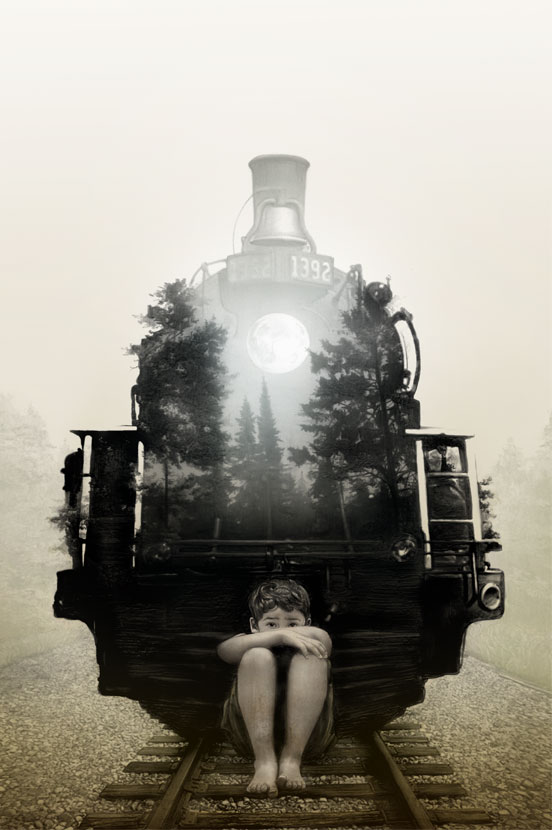Welcome back to the Short Fiction Spotlight, a space for conversation about recent and not-so-recent short stories. Last time, we talked about two stories from two different recent magazines; in this installment, I’d like to focus on one publication and one story. Though I don’t do it often, this time I’m going to talk about a piece from here at Tor.com: the novella “Where the Trains Turn” by Pasi Ilmari Jääskeläinen and translated by Liisa Rantalaiho.
This novella won two prizes in the original Finnish; this is the first English publication of the piece. It’s—quite obviously—long, and also has a sort of measured, careful, sedate pace that balances on the fine line between “too slow” and “too quick.” It’s also a piece I’d call a quiet story, told as it is from the point of view of the (perhaps too) reasonable and logic-driven protagonist.
I’ll admit that as soon as I noticed there was a translated story available for my perusal, here, I jumped on it. I appreciate seeing works in translation from non-Anglophone writers in part because there’s something deeply compelling about the manner of “world” that presents itself in them. The tone and prose—the rhythm of the language—is often unfamiliar and delightful; the turns of phrase are in particular a pleasure. It seems to me that reading outside of the US/UK/Canada cycle, especially for fantastic literature, is pretty important, and honestly, I like to see how writers with entirely different backgrounds and sets of life experience do their imagining.
So, “Where the Trains Turn,” then. The first thing I’d note is the quality of the translation: though I can’t speak to the Finnish reading experience, I would say that the English version produced by Rantalaiho seems to reflect the speech and prose patterns of the original text. The narrator’s voice is intimate without feeling particularly warm or inviting; there’s a fantastic balance of the deeply personal with the “factually observed” as she explains the bare bones of the truth (as she has perceived it). It would read like reportage, almost, if it weren’t for the colloquialisms (“mink food”) and the emotional observations she also spreads out across the narrative.
That style is also what makes the piece engaging in a subtle and solid way: while I never felt particularly pulled along—the story moves slower than that—I also never felt that I should take a pause or look at something else. There’s a subdued energy to the building narrative as we move through time, back and forth, learning of her son’s childhood and adulthood and finally the catastrophic scrambling event that changes her entire existence. Without the measured and resolute building of this very individual, very narrow perspective, the story’s close would have far less of an impact.
But with that time invested, with the audience’s eventual realization of the significance of the trains and time in the characters’ lives, the conclusion has the proper scope and scale to be as discomfiting—perhaps even devastating—as it needs to be. I often dislike stories of “time travel” or that otherwise loop or change timelines; I think as a device it’s overused and rarely put to good use. However, Jääskeläinen managed to turn the trope into something that still has bite and function; it reminds me a bit, crosswise, of Ted Chiang’s “Story of Your Life.” When the protagonist’s son kills the train that killed her best friend in her childhood, that death never occurs—and her whole life runs a different track because of it. She never has the child; she never takes women lovers; she never explores that “dinosaur” side of herself that she knows to have existed once. And yet, the loss is not overplayed or overstated; it’s something that she struggles quietly and privately against, recording factual observations in its favor. But she also can’t let it go.
There’s also something to be said for the insistence through the majority of the story that the protagonist’s son has an overactive imagination, that nothing odd has happened. It doesn’t read like the old horror-movie staple of the parent who doesn’t believe until it’s too late; the horror is not that the trains are creatures that slip reality sometimes, which is a weird and uncomfortable reality in the end, but the persistence of memory and the instability of time. It’s an existential horror, a horror of inexplicable and ghostly loss. The obvious angle would have been the “scary train monsters” angle, and that is not the direction the narrative finally takes. Instead, it speaks more clearly and causally to the relationships between people and the hollow impossibility of a loss so vast that it no longer exists in the proper timeline.
I appreciate the slow-burn build of this story and the places it ends up. It’s a solid, intense, unique exploration of concepts and images that are perhaps familiar—the timeline shift, the malevolent train, the loss of a child—that is done with a delightfully fresh and intimate voice. I liked it quite a lot, in a reserved sort of way that I suspect the protagonist might approve of.
Lee Mandelo is a writer, critic, and editor whose primary fields of interest are speculative fiction and queer literature, especially when the two coincide. She can be found on Twitter or her website.










